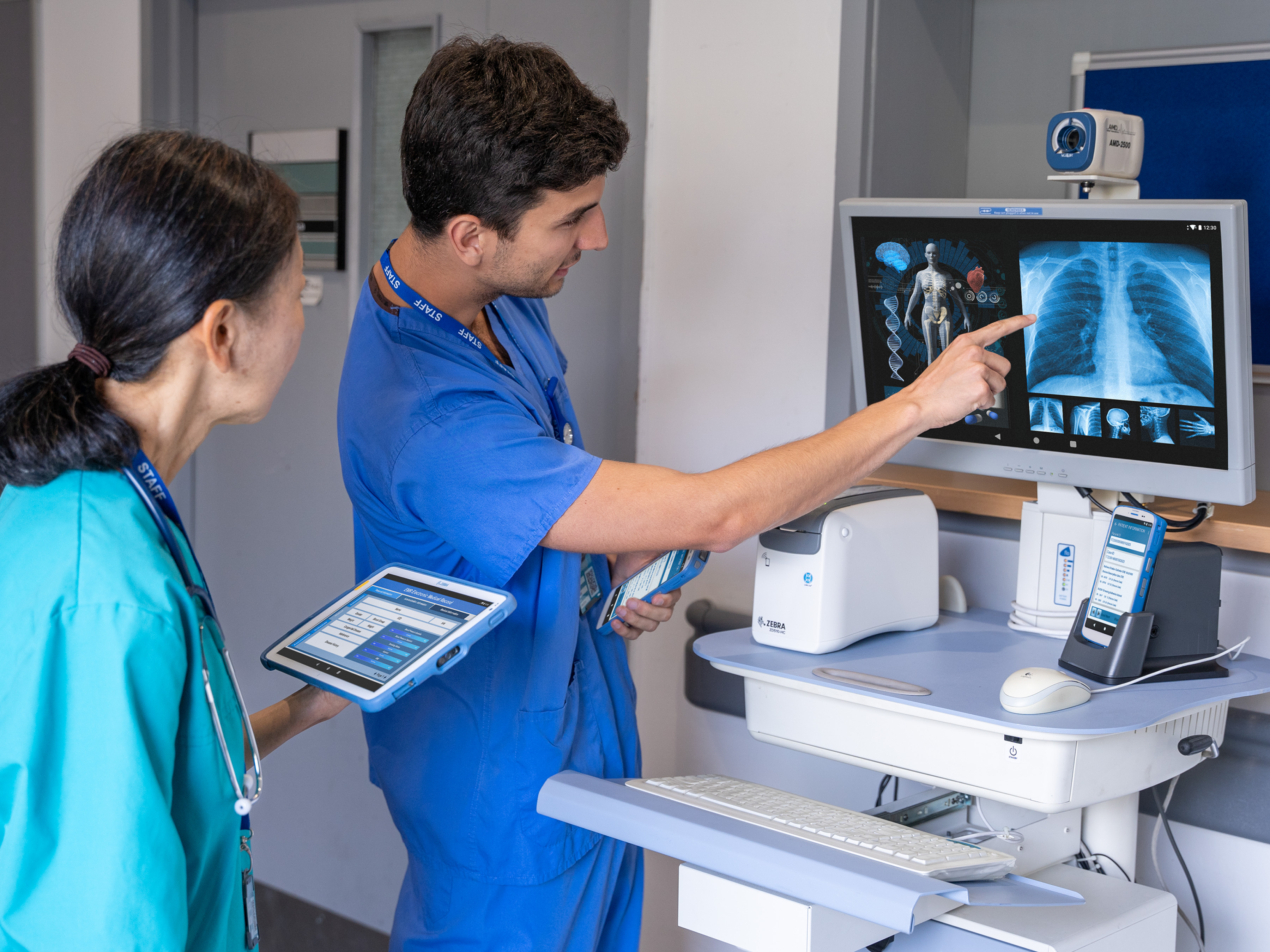Transform retail operations with Zebra’s retail technology solutions, featuring hardware and software for improving inventory management and empowering teams.
Streamline operations with Zebra’s healthcare technology solutions, featuring hardware and software to improve staff collaboration and optimise workflows.
Enhance processes with Zebra’s manufacturing technology solutions, featuring hardware and software for automation, data analysis, and factory connectivity.
Zebra’s transportation and logistics technology solutions feature hardware and software for enhancing route planning, visibility, and automating processes.
Zebra's hospitality technology solutions equip your hotel and restaurant staff to deliver superior customer and guest service through inventory tracking and more.
Zebra's market-leading solutions and products improve customer satisfaction with a lower cost per interaction by keeping service representatives connected with colleagues, customers, management and the tools they use to satisfy customers across the supply chain.
Empower your field workers with purpose-driven mobile technology solutions to help them capture and share critical data in any environment.
Zebra's range of mobile computers equip your workforce with the devices they need from handhelds and tablets to wearables and vehicle-mounted computers.
Zebra's desktop, mobile, industrial, and portable printers for barcode labels, receipts, RFID tags and cards give you smarter ways to track and manage assets.
Zebra's 1D and 2D corded and cordless barcode scanners anticipate any scanning challenge in a variety of environments, whether retail, healthcare, T&L or manufacturing.
Zebra's extensive range of RAIN RFID readers, antennas, and printers give you consistent and accurate tracking.
Choose Zebra's reliable barcode, RFID and card supplies carefully selected to ensure high performance, print quality, durability and readability.
Zebra's rugged tablets and 2-in-1 laptops are thin and lightweight, yet rugged to work wherever you do on familiar and easy-to-use Windows or Android OS.
With Zebra's family of fixed industrial scanners and machine vision technologies, you can tailor your solutions to your environment and applications.
Zebra’s line of kiosks can meet any self-service or digital signage need, from checking prices and stock on an in-aisle store kiosk to fully-featured kiosks that can be deployed on the wall, counter, desktop or floor in a retail store, hotel, airport check-in gate, physician’s office, local government office and more.
Discover Zebra’s range of accessories from chargers, communication cables to cases to help you customise your mobile device for optimal efficiency.
Zebra's environmental sensors monitor temperature-sensitive products, offering data insights on environmental conditions across industry applications.
Zebra's location technologies provide real-time tracking for your organisation to better manage and optimise your critical assets and create more efficient workflows.
Enhance frontline operations with Zebra’s AI software solutions, which optimize workflows, streamline processes, and simplify tasks for improved business outcomes.
Empower your frontline with Zebra Companion AI, offering instant, tailored insights and support to streamline operations and enhance productivity.
Boost productivity with Zebra Frontline AI Enablers: AI vision models, sample apps, and APIs streamline workflows for efficient business processes.
Zebra Frontline AI Blueprints deliver adaptable, real-world AI frameworks that automate manual tasks and drive efficiency in high-pressure frontline operations.
Zebra Workcloud, enterprise software solutions boost efficiency, cut costs, improve inventory management, simplify communication and optimize resources.
Keep labour costs low, your talent happy and your organisation compliant. Create an agile operation that can navigate unexpected schedule changes and customer demand to drive sales, satisfy customers and improve your bottom line.
Drive successful enterprise collaboration with prioritized task notifications and improved communication capabilities for easier team collaboration.
Get full visibility of your inventory and automatically pinpoint leaks across all channels.
Reduce uncertainty when you anticipate market volatility. Predict, plan and stay agile to align inventory with shifting demand.
Drive down costs while driving up employee, security, and network performance with software designed to enhance Zebra's wireless infrastructure and mobile solutions.
Explore Zebra’s printer software to integrate, manage and monitor printers easily, maximising IT resources and minimising down time.
Make the most of every stage of your scanning journey from deployment to optimisation. Zebra's barcode scanner software lets you keep devices current and adapt them to your business needs for a stronger ROI across the full lifecycle.
RFID development, demonstration and production software and utilities help you build and manage your RFID deployments more efficiently.
RFID development, demonstration and production software and utilities help you build and manage your RFID deployments more efficiently.
Zebra DNA is the industry’s broadest suite of enterprise software that delivers an ideal experience for all during the entire lifetime of every Zebra device.
Advance your digital transformation and execute your strategic plans with the help of the right location and tracking technology.
The Zebra Aurora suite of machine vision software enables users to solve their track-and-trace, vision inspection and industrial automation needs.
Zebra Aurora Focus brings a new level of simplicity to controlling enterprise-wide manufacturing and logistics automation solutions. With this powerful interface, it’s easy to set up, deploy and run Zebra’s Fixed Industrial Scanners and Machine Vision Smart Cameras, eliminating the need for different tools and reducing training and deployment time.
Aurora Imaging Library™, formerly Matrox Imaging Library, machine-vision software development kit (SDK) has a deep collection of tools for image capture, processing, analysis, annotation, display, and archiving. Code-level customisation starts here.
Aurora Design Assistant™, formerly Matrox Design Assistant, integrated development environment (IDE) is a flowchart-based platform for building machine vision applications, with templates to speed up development and bring solutions online quicker.
Designed for experienced programmers proficient in vision applications, Aurora Vision Library provides the same sophisticated functionality as our Aurora Vision Studio software but presented in programming language.
Aurora Vision Studio, an image processing software for machine & computer vision engineers, allows quick creation, integration & monitoring of powerful OEM vision applications.
Adding innovative tech is critical to your success, but it can be complex and disruptive. Professional Services help you accelerate adoption, and maximise productivity without affecting your workflows, business processes and finances.
Zebra's Managed Service delivers worry-free device management to ensure ultimate uptime for your Zebra Mobile Computers and Printers via dedicated experts.
Find ways you can contact Zebra Technologies’ Support, including Email and Chat, ask a technical question or initiate a Repair Request.
Zebra's Circular Economy Program helps you manage today’s challenges and plan for tomorrow with smart solutions that are good for your budget and the environment.

Zebra RFID Forum Part One - Could This Finally be the Year of RFID?
In the world of technology, the expectations for RFID to become a game-changer have been clear for decades. Yet, as Nuno Miguel Guimarães from Sensormatic highlighted during Zebra’s inaugural RFID Forum in Prague, the industry has long heralded each year as “the year of RFID.”
The question remains: why is now different? The answer lies in a convergence of factors that are turning potential into reality. With less than 0.4% of connectable items currently connected, the RFID market is poised for unprecedented growth across sectors like retail, manufacturing, transportation, and healthcare.
One of the driving forces behind this transformation is the evolving consumer expectation for faster, more predictable, and transparent delivery services. As Rusty Redecker from Avery Dennison pointed out, supply chains must now become more responsive and technologically sophisticated to meet these demands.
Consumers expect more. They want more predictable, faster, and transparent delivery, which is prompting supply chains to become more responsive and technologically advanced.
Data will drive the future. It is driving us now! RFID technology, with its ability to provide real-time data, plays a crucial role in this evolution. Ralf Kodritsch from NXP underscored this point by stating, “We have created more data in the last three years than in our entire history.” This explosion of data generation, paired with advanced analytics, empowers businesses to make better, faster decisions.
Labor is in short supply. And it is getting more expensive. Which means people need to be more effective at keeping costs down and meeting customer expectations.
Sustainability matters. No longer a nice to have in business, sustainability is a measure of success. It builds greener logistics that benefit the planet and increases efficiency that fuels the bottom line.
Sustainability is a critical accelerator. As businesses strive to reduce their environmental footprint, RFID technology emerges as a vital tool for building greener logistics and enhancing operational efficiency. Bosch’s Harald Ziegler shared an inspiring example with the development of a 100% recyclable RFID Kanban card, demonstrating RFID’s potential in creating sustainable solutions.
Katarzyna Pokwicka-Croucher from Ecopolplast built on the sustainability message, spotlighting the integration of RFID with digital product passports for her recycled tire and recycled plastics product. RFID enables the creation of a digital twin of products, providing accessible data on origin, batch, and environmental impact—vital information for consumers and businesses alike.
Discussing RFID applications upstream from the tire recycling process, Pierre Guinault, Michelin with partner Miika Pylvänäinen, Beontag presented on the different tags that can be used to identify tires throughout their lifecycle. They looked at how it supports recycling, and how it integrates with a Digital Product Passport.
Dirk Bansemur from Euro Plant Tray added to this narrative by illustrating how RFID is used to manage reusable plant trays, reducing landfill waste in the horticultural industry.
Our RFID Forum made it clear that the convergence of consumer expectations, data proliferation, labor shortages, and sustainability imperatives is finally setting the stage for RFID to shine. As industry players collaborate and innovate, the potential for RFID to transform operations and drive efficiency is immense. Stay tuned for Part Two of this post, where we’ll explore more real-world applications and the cutting-edge technologies that are propelling RFID into the spotlight.
Zebra Developer Blog
Zebra Developer BlogZebra Developer Blog
Are you a Zebra Developer? Find more technical discussions on our Developer Portal blog.
Zebra Story Hub
Zebra Story HubZebra Story Hub
Looking for more expert insights? Visit the Zebra Story Hub for more interviews, news, and industry trend analysis.
Search the Blog
Search the BlogSearch the Blog
Use the below link to search all of our blog posts.
Most Recent
Legal Terms of Use Privacy Policy Supply Chain Transparency
ZEBRA and the stylized Zebra head are trademarks of Zebra Technologies Corp., registered in many jurisdictions worldwide. All other trademarks are the property of their respective owners. Note: Some content or images on zebra.com may have been generated in whole or in part by AI. ©2026 Zebra Technologies Corp. and/or its affiliates.




